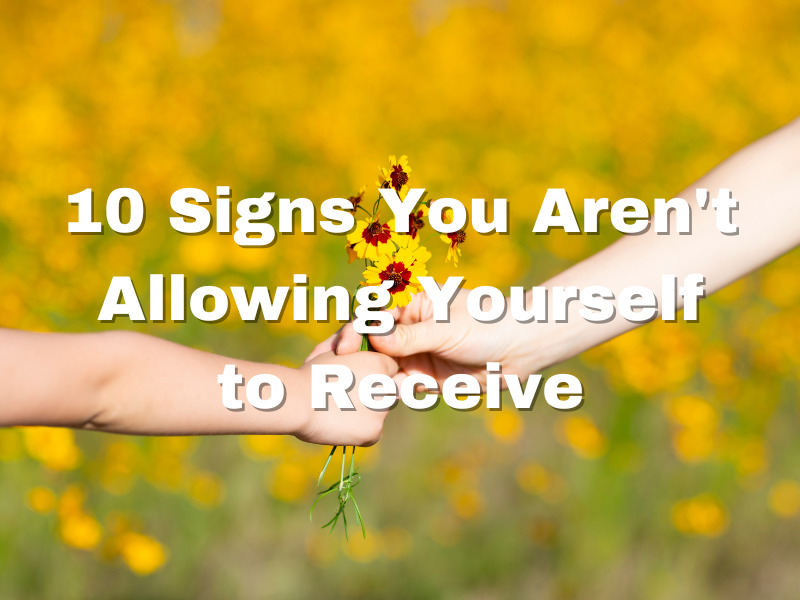Notice: I’m an affiliate for Amazon as well as other companies. Any links in this article may be affiliate links. I always appreciate it if you purchase something using my affiliate links. Doing so helps me to raise a little extra money that pays for the costs of running this site. And it allows me to continue bringing you quality content, all without costing you a thing! Thanks!
We have all been taught that it is better to give than to receive. But both are equally important. Many, however, have spent more time focusing on giving and don’t know how to receive. This is especially common for women. It was an issue for me for a long time. I was a chronic people-pleaser. And was uncomfortable receiving. But what I found is that this bad habit prevents others in our lives from experiencing the joy of giving to us. But how do you know if you aren’t allowing yourself to receive? Here are some of the things I experienced.
10 common signs you aren’t allowing yourself to receive
Difficulty accepting compliments
Accepting compliments can be a beautiful expression of acknowledging our worth and the positive impact we have on others. Yet, I found it challenging to receive these kind words of appreciation for a long time. It was uncomfortable to accept a compliment. Because of that, I often downplayed compliments and deflected them. I had to learn that accepting compliments is not about arrogance or seeking validation. but about honoring my own unique qualities and allowing myself to be seen and celebrated.
By embracing compliments with gratitude and an open heart, we nourish our self-esteem and foster deeper connections with those who recognize and value our true essence. If you struggle to receive compliments graciously or tend to downplay or dismiss them, it may indicate that you have trouble accepting praise or acknowledging your own worth. That was certainly true for me.
Self-sabotage
Self-sabotage can be a sneaky and insidious habit that holds us back from reaching our full potential. It’s that self-destructive pattern that seems to sabotage our own success, happiness, and personal growth. We may find ourselves procrastinating, making excuses, or engaging in behaviors that undermine our goals and dreams. I did this to myself for decades! But why do we do this to ourselves? Often, self-sabotage stems from fear of failure, fear of success, or deeply ingrained limiting beliefs that we are unworthy or incapable of achieving greatness.
However, it’s important to realize that self-sabotage is not our true nature; it’s a learned response that can be unlearned. By cultivating self-awareness, identifying our self-sabotaging behaviors, and challenging the underlying beliefs that drive them, we can break free from this cycle and unlock our true potential. It’s time to rewrite our inner narrative, embrace self-compassion, and step into a future where we thrive and achieve the success we truly deserve.
Feeling unworthy
Feeling unworthy is an all too common struggle that can cast a dark shadow over our lives. It whispers in our minds, convincing us that we don’t deserve love, happiness, or success. It creeps into our hearts, eroding our self-esteem and causing us to question our own value. Being a plus-sized woman for most of my adult life, there have been many people who have tried to tell me that the number on the scale was proof that I’m not worthy. That me being overweight somehow meant that I deserved less in my life. And now, being middle-aged in a society that prizes youth gives the same message. But here’s the truth: you are inherently worthy, just as you are. Your worth is not defined by external validation or achievements. It isn’t about how much you weigh or make; it is an intrinsic part of your being.
The journey to embracing your worthiness begins with recognizing the negative self-talk and limiting beliefs that perpetuate these feelings of unworthiness. It involves challenging the critical voice within and replacing it with self-compassion and self-love. It requires acknowledging your unique strengths, embracing your imperfections, and honoring the incredible person you are. Remember, you are deserving of all the love, joy, and abundance that life has to offer. It’s time to break free from the chains of feeling unworthy and step into the light of your true worth.
Fear of vulnerability
The fear of vulnerability can be a formidable obstacle on our path to deep and meaningful connections. It’s a natural human instinct to protect ourselves from potential pain or rejection by keeping our walls up. But in doing so, we unintentionally build barriers that hinder the very connections we crave. Vulnerability, however, is the gateway to true intimacy and authenticity. It’s the willingness to show up as our genuine selves, flaws and all, and allow others to see us in our rawest form. It requires courage, as it means risking rejection or being hurt.
This is something that I’ve struggled with and that I’m still working on. Experiences such as divorce have caused me to be far more cautious and less trusting. And it has prevented me from being willing to be vulnerable as easily. But I’m learning that when I bravely lean into vulnerability, I create an environment that fosters trust, understanding, and empathy. It’s in those vulnerable moments that we find true connection, deep bonds, and a sense of belonging.
People-pleasing
People-pleasing can be an ingrained pattern that keeps us locked in a cycle of seeking validation and approval from others. It’s the tendency to prioritize the needs and desires of others above our own, often at the expense of our own well-being. While the intention to make others happy is noble, people-pleasing can be detrimental to our own growth, happiness, and authenticity. It stems from a fear of rejection or conflict, driving us to constantly put others’ needs before our own. I am not shy about sharing my people-pleasing tendencies with others because it has been an issue for me for such a long time.
However, it’s essential to remember that our worthiness doesn’t rely on making everyone else happy. True fulfillment and genuine connections are born from honoring our own needs and boundaries. By practicing self-care, setting healthy boundaries, and cultivating self-compassion, we can break free from the chains of people-pleasing and embrace a life rooted in authenticity and self-empowerment.
Difficulty asking for help
Difficulty asking for help is a common struggle many of us face. Whether it’s due to a fear of burdening others, a desire to maintain independence, or a belief that we should handle everything on our own, it can be challenging to reach out and seek support when we need it most. However, asking for help is not a sign of weakness but rather a display of strength and self-awareness. It allows us to lean on the collective wisdom and resources of those around us. When we open ourselves to receiving help, we foster deeper connections and create a network of support that uplifts us during challenging times. Remember, we all deserve assistance and guidance. So embrace vulnerability, let go of the notion that we must face everything alone, and reach out to those willing to lend a helping hand.
Financial struggles
Financial struggles can feel overwhelming and deeply challenging. Whether it’s living paycheck to paycheck, dealing with debt, or feeling limited by financial constraints, the weight of these struggles can take a toll on our well-being. However, it’s important to remember that financial difficulties do not define our worth or potential. Chronic financial difficulties, such as living paycheck to paycheck or not allowing yourself to enjoy the fruits of your labor, can indicate an underlying resistance to receiving abundance and financial well-being.
This has been a big struggle for me throughout the years. Of course, it is a pattern I learned from my own parents. And I struggle to receive money. I’ve self-sabotaged myself in the area of money as well. This has shown up in not being willing to charge what I’m worth or not asking for raises through the years.
Closed-off body language
Closed-off body language can serve as a subtle yet significant sign that we are not fully allowing ourselves to receive. When we cross our arms, hunch our shoulders, or create physical barriers between ourselves and others, we unintentionally create a shield that blocks the flow of positive energy and opportunities coming our way. This closed-off stance reflects a reluctance to embrace the abundance and support that surrounds us. By remaining closed off, we inadvertently limit our ability to receive love, kindness, and the gifts that life has to offer. I’ve done this, but have gotten much better…unless I’m overly tired or really don’t want someone to get close (and there are people that is absolutely appropriate to do this with).
It’s important to be mindful of our body language and make a conscious effort to open ourselves up. Embracing a more open and receptive posture sends a powerful message to the universe that we are ready to receive all the goodness it has in store for us. Let’s break down these barriers, both physical and emotional, and allow ourselves to bask in the abundant blessings that await us.
Dismissing opportunities
When we find ourselves dismissing or overlooking opportunities, it can be a clear sign that we are not fully allowing ourselves to receive the abundance that life has to offer. Sometimes, fear, self-doubt, or a limited mindset can lead us to downplay or ignore the potential doors that open before us. By doing so, we inadvertently close ourselves off from new experiences, growth, and the chance to discover hidden blessings. It’s crucial to recognize that every opportunity, no matter how small or uncertain, carries the potential for growth and transformation. By embracing a mindset of openness, curiosity, and trust in the journey, we invite opportunities to flow into our lives.
Lack of self-care
I don’t know about you, but until a few years ago, I always felt so guilty if I took time for self-care. Neglecting your own self-care needs, such as not taking breaks, ignoring your physical and mental health, or not investing time and resources in activities that bring you joy, can be an indication that you are not allowing yourself to receive the nourishment and care you deserve.
When we neglect self-care, it can be a glaring sign that we are not fully allowing ourselves to receive the love, care, and attention we deserve. Putting others’ needs before our own, constantly pushing ourselves to the limit, or dismissing the importance of self-care can create a barrier to receiving the nourishment our mind, body, and soul crave. Self-care goes beyond pampering; it’s about prioritizing our well-being, setting healthy boundaries, and honoring our own needs.
By neglecting self-care, we deny ourselves the opportunity to replenish and recharge, which ultimately affects our ability to show up fully in all areas of life. It’s essential to recognize that self-care is not selfish; it is an act of self-love and an investment in our overall happiness and fulfillment. Remember, when we prioritize our own well-being, we create the space to receive all the beauty and joy life has to offer. And the saying that “you can’t pour from an empty cup” is absolutely true! You aren’t going to have anything to give others if you don’t give to yourself first!
It’s important to remember that recognizing these signs is the first step toward addressing them. Being aware of your tendencies can help you consciously shift your mindset and behavior to become more open to receiving the good things life has to offer.
Are you an empath or a highly sensitive person? If you aren’t sure, check out my empath quiz!




